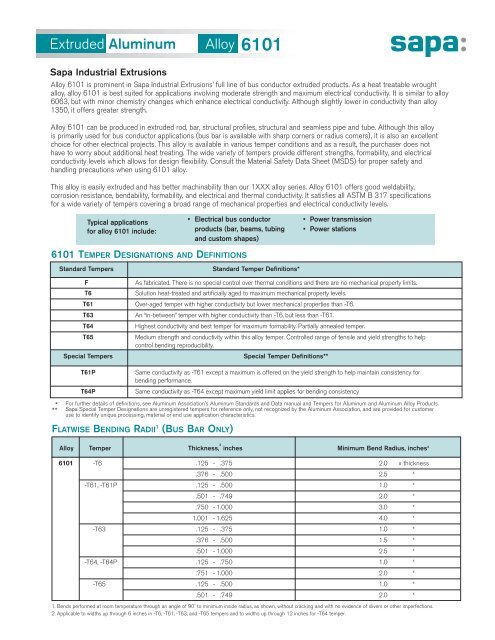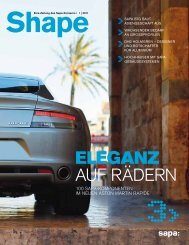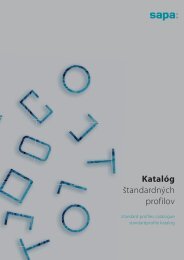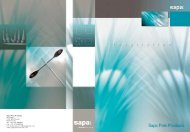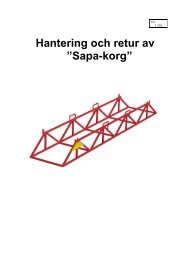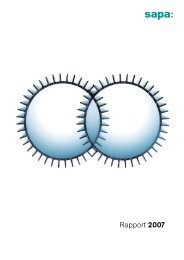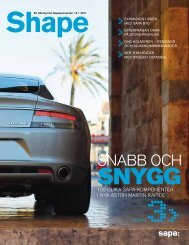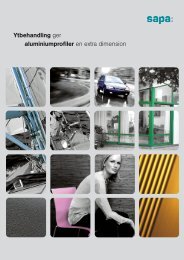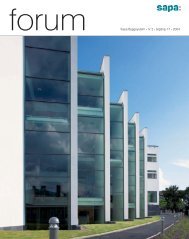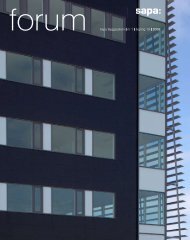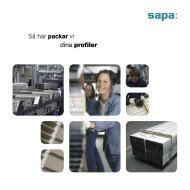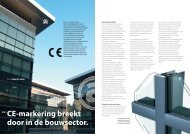Extruded Aluminum Alloy 6101 - Sapa Group
Extruded Aluminum Alloy 6101 - Sapa Group
Extruded Aluminum Alloy 6101 - Sapa Group
Create successful ePaper yourself
Turn your PDF publications into a flip-book with our unique Google optimized e-Paper software.
<strong>Extruded</strong> <strong>Aluminum</strong> <strong>Alloy</strong><br />
<strong>Sapa</strong> Industrial Extrusions<br />
<strong>6101</strong><br />
<strong>Alloy</strong> <strong>6101</strong> is prominent in <strong>Sapa</strong> Industrial Extrusions’ full line of bus conductor extruded products. As a heat treatable wrought<br />
alloy, alloy <strong>6101</strong> is best suited for applications involving moderate strength and maximum electrical conductivity. It is similar to alloy<br />
6063, but with minor chemistry changes which enhance electrical conductivity. Although slightly lower in conductivity than alloy<br />
1350, it offers greater strength.<br />
<strong>Alloy</strong> <strong>6101</strong> can be produced in extruded rod, bar, structural profiles, structural and seamless pipe and tube. Although this alloy<br />
is primarily used for bus conductor applications (bus bar is available with sharp corners or radius corners), it is also an excellent<br />
choice for other electrical projects. This alloy is available in various temper conditions and as a result, the purchaser does not<br />
have to worry about additional heat treating. The wide variety of tempers provide different strengths, formability, and electrical<br />
conductivity levels which allows for design flexibility. Consult the Material Safety Data Sheet (MSDS) for proper safety and<br />
handling precautions when using <strong>6101</strong> alloy.<br />
This alloy is easily extruded and has better machinability than our 1XXX alloy series. <strong>Alloy</strong> <strong>6101</strong> offers good weldability,<br />
corrosion resistance, bendability, formability, and electrical and thermal conductivity. It satisfies all ASTM B 317 specifications<br />
for a wide variety of tempers covering a broad range of mechanical properties and electrical conductivity levels.<br />
Typical applications<br />
for alloy <strong>6101</strong> include:<br />
<strong>6101</strong> TEMPER DESIGNATIONS AND DEFINITIONS<br />
• Electrical bus conductor • Power transmission<br />
products (bar, beams, tubing • Power stations<br />
and custom shapes)<br />
* For further details of definitions, see <strong>Aluminum</strong> Association’s <strong>Aluminum</strong> Standards and Data manual and Tempers for <strong>Aluminum</strong> and <strong>Aluminum</strong> <strong>Alloy</strong> Products.<br />
<strong>Sapa</strong> Special Temper Designations are unregistered tempers for reference only, not recognized by the <strong>Aluminum</strong> Association, and are provided for customer<br />
use to identify unique processing, material or end use application characteristics.<br />
**<br />
Standard Tempers Standard Temper Definitions*<br />
F As fabricated. There is no special control over thermal conditions and there are no mechanical property limits.<br />
T6 Solution heat-treated and artificially aged to maximum mechanical property levels.<br />
T61 Over-aged temper with higher conductivity but lower mechanical properties than -T6.<br />
T63 An “in-between” temper with higher conductivity than -T6, but less than -T61.<br />
T64 Highest conductivity and best temper for maximum formability. Partially annealed temper.<br />
T65 Medium strength and conductivity within this alloy temper. Controlled range of tensile and yield strengths to help<br />
control bending reproducibility.<br />
Special Tempers Special Temper Definitions**<br />
T61P Same conductivity as -T61 except a maximum is offered on the yield strength to help maintain consistency for<br />
bending performance.<br />
T64P Same conductivity as -T64 except maximum yield limit applies for bending consistency<br />
FLATWISE BENDING RADII 1 (BUS BAR ONLY)<br />
<strong>Alloy</strong> Temper Thickness, 2<br />
inches Minimum Bend Radius, inches2 <strong>6101</strong> -T6 .125 - .375 2.0 x thickness<br />
.376 - .500 2.5 “<br />
-T61, -T61P .125 - .500 1.0 “<br />
.501 - .749 2.0 “<br />
.750 - 1.000 3.0 “<br />
1.001 - 1.625 4.0 “<br />
-T63 .125 - .375 1.0 “<br />
.376 - .500 1.5 “<br />
.501 - 1.000 2.5 “<br />
-T64, -T64P .125 - .750 1.0 “<br />
.751 - 1.000 2.0 “<br />
-T65 .125 - .500 1.0 “<br />
.501 - .749 2.0 “<br />
1. Bends performed at room temperature through an angle of 90˚ to minimum inside radius, as shown, without cracking and with no evidence of slivers or other imperfections.<br />
2. Applicable to widths up through 6 inches in -T6, -T61, -T63, and -T65 tempers and to widths up through 12 inches for -T64 temper.
CHEMICAL COMPOSITION Melting Temperature Range: 1150-1210 ºF Density: 0.097 lb./in. 3<br />
<strong>6101</strong> EXTRUDED MECHANICAL AND PHYSICAL PROPERTY LIMITS 1 *<br />
* Elongation values are not required for this particular alloy.<br />
1. Minimum property levels unless shown as a range or indicated as a maximum (max.)<br />
2. The thickness of the cross section from which the tension test specimen is taken determines the applicable mechanical properties.<br />
**<br />
<strong>Alloy</strong> Si Fe Cu Mn Mg Cr Zn Ti B Others<br />
Each Total<br />
<strong>6101</strong> 0.30-0.7 0.50 0.10 0.03 0.35-0.8 0.03 0.10 – .06 0.03* 0.10<br />
Chemical composition in weight percent maximum unless shown as a range or minimum.<br />
Average Coefficient of Thermal Expansion (68º to 212ºF) = 13.0 x 10 -6 (in./in.ºF)<br />
Standard Wall Thickness 2<br />
Tensile Strength Yield Strength<br />
Tempers Inches (min.) Ksi (min.) Ksi (min.)<br />
F All No Properties Apply<br />
Typical Thermal<br />
Conductivity, @77°F,<br />
BTU-in./ft. 2 hr.°F<br />
T6 0.125 - 0.500 29.0 25.0 1510 55.0<br />
T61 0.125 - 0.749 20.0 15.0 1540 57.0<br />
0.750 - 1.499 18.0 11.0 1540 57.0<br />
1.500 - 2.000 15.0 8.0 1540 57.0<br />
T63 0.125 - 1.000 27.0 22.0 1510 56.0<br />
T64 0.125 - 1.000 15.0 8.0 1570 59.5<br />
T65 0.125 - 0.749 25.0 - 32.0 20.0 - 27.0 1510 56.5<br />
Special Tempers**<br />
OP 0.125 - 1.000 19.0 max 8.0 max – 59.5<br />
T61P 0.125 - 0.500 20.0 15.0 - 22.0 1540 57.0<br />
T64P 0.125 - 1.000 15.0 8.0 - 15.0 1570 59.5<br />
<strong>Sapa</strong> Special Temper Designations are unregistered tempers for reference only, not recognized by the <strong>Aluminum</strong> Association, and are<br />
provided for customer use to identify unique processing, material or end use application characteristics.<br />
COMPARATIVE CHARACTERISTICS OF RELATED ALLOYS/TEMPERS 1<br />
Typical Electrical<br />
Conductivity (min.),<br />
@68ºF, % IACS<br />
General<br />
Corrosion Anodizing<br />
<strong>Alloy</strong> Temper Formability Machinability Resistance Weldability Brazeability Response<br />
D C B A D C B A D C B A D C B A D C B A D C B A<br />
<strong>6101</strong> -T6, -T63<br />
6061 -T4<br />
6063 -O<br />
-T61, -T64<br />
-T61P, -T64P<br />
-T6, -T6511<br />
-T1, -T4<br />
-T5<br />
-T6<br />
1350 -H111<br />
1. Rating: A=Excellent B=Good C=Fair D=Poor<br />
<strong>Sapa</strong> Industrial Extrusions<br />
53 Pottsville Street<br />
Cressona, PA 17929<br />
Phone: 800-233-3165<br />
FAX: 800-252-4646<br />
www.sapagroup.com/us/industrialextrusions<br />
<strong>Aluminum</strong> = Remainder


